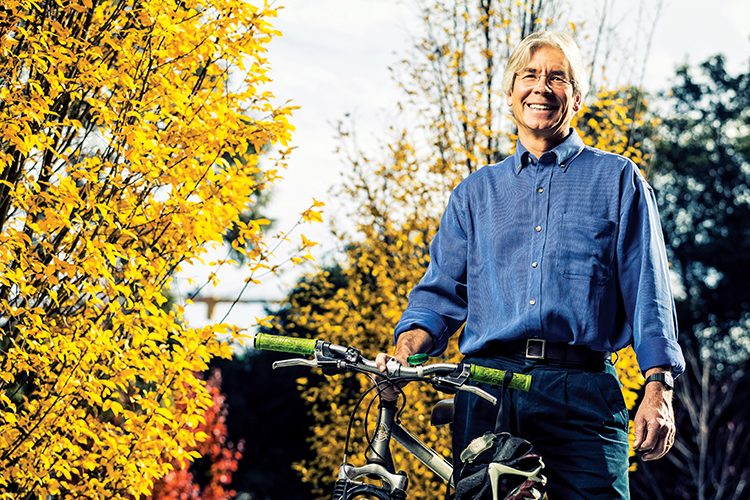In an era of stainless steel straws and reusable grocery bags, many buy into the sustainable lifestyle but think that one person’s habits can’t fully save the environment.
Christopher Gardner ’81, Stanford University’s director of nutrition studies and a professor of medicine at the Prevention Research Center, agrees. That’s why he studies how a group’s practices can affect the planet, rather than an individual’s.
“I’m really interested in working with hospital food, university food, and work site food, because those folks are a captive audience,” he says. It’s an approach he calls Institutional Food.
“If you can change food at institutions, if you can change the demand and the appeal, make it seem important and [like] social justice, then the chefs start ordering differently,” Gardner says. “Then you start changing agriculture.” If businesses shifted from buying animal foods to purchasing more plant-based foods, it would be better for the environment because their growing process emits less greenhouse gas and uses fewer fossil fuels. “The cultivation of produce is more sustainable than that of meat, particularly beef,” he says.
After Colgate, the philosophy major pursued personal passions, like biking across Europe, followed by two years of undergraduate science courses at Berkeley to qualify for its master’s program in nutrition. He earned his PhD in nutrition science, and then a postdoctoral fellowship took him to Stanford, where he’s been working for 26 years.
“What I found in grad school is that a lot of the nutrition being studied is mechanistic,” Gardner says. “I wanted to study behavior and people’s motivations for food choices.” One angle he’s now taken is something he calls stealth nutrition, which he describes as encouraging people to adopt healthier diets by informing them of nonhealth-related incentives.
To test his stealth nutrition theory, Gardner co-taught a class at Stanford focusing on how food affects other aspects of life, like the environment. “We made a vow in Food and Society that we would never mention health, that we would only read popular books [like Omnivore’s Dilemma],” he says. In essence, Gardner’s students knowingly became his guinea pigs. Would learning about food production’s environmentally harmful practices change what they ate?
It did. The Gen Zs became vegetarian, pledged to only eat sustainable beef, or stopped eating fast food. Just like that, he was able to shift the food views of many students in the class. And because they did it as a group, their contributions made a greater impact.
“What I’m trying to get the students at Stanford to think of is Malcolm Gladwell’s tipping point. You don’t actually have to get everybody to eat this way, but you need to get a lot of people to change, enough that you’re changing what the ranchers produce, and what the produce folks produce.”
A vegetarian, he practices what he preaches.

